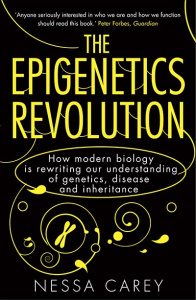The Epigenetics Revolution
 By Nessa Carey
By Nessa Carey
Review by Katie H (Biochemistry)
The Epigenetics Revolution by Nessa Carey is a book that was recommended to me during my Biochemistry interview at Univ, so I read it over the summer after my A Levels. I had no idea what Epigenetics was before reading this book but after getting just a couple of pages in I couldn’t believe how much I had been missing out on!
Epigenetics is the study of differences between genetically identical organisms which have non-identical phenotypes. How can this be possible if their genetic code is exactly the same? An example, given by Carey, is seen in caterpillars which later develop into butterflies, with no change in their DNA sequence. These differences are a matter of changes to gene expression as a result of some environmental impact. Approximately 98 percent of the DNA in the human genome is non-coding (exons), which means that it does not encode a protein, however this does not mean that it has no function.
I would strongly encourage anybody with an interest in biochemistry or biology to read this book as it provides a detailed, yet accessible, insight into the revolutionary new discipline of Epigenetics. Anybody interested in exploring the Nature vs. Nurture debate should also definitely read this book! Some of the concepts are challenging to grasp but that makes it even more rewarding when you come to terms with it and begin to understand the theories that underpin Epigenetics.
I thoroughly enjoyed reading this book because it touches on a subject which is largely overlooked by the A Level Biology syllabus and yet it is such a relevant and fast-moving field in biology in recent years, with many potentially significant clinical and diagnostic applications.
Review by Greta (Medicine)
Reading The Epigenetics Revolution was the first time I read a science book outside my school curriculum. In this book, Nessa Carey describes how the world around you can and will influence everything about the way your body works by changing your genetic material. I found this book so interesting because it made me think about genetics in a completely new way, as something changeable and constantly developing, as opposed to the rigid structure I had thought of before.
For me, one of the most interesting parts of the book was the explanation of how your environment growing up, as well as your genetics, both influence mental health. This was particularly fascinating as it shows how epigenetics, which seems like a very niche subject, is relevant to people in their day to day lives. It also made me think a lot more about the genetics I was learning about in school, and how it can all be ultimately applied to real people.
Although I did find this book difficult at times, especially the technical scientific language, Nessa Carey takes great care to explain things in a way that everyone can understand. In fact, the challenging parts of the book were what made reading it so satisfying, as it gave me a great sense of accomplishment once I was finished.
Overall, I would definitely recommend this book for anyone interested in anything biology related! It is a challenging, but really interesting read, and perhaps, as it did for me, it will change the way you think about biology!
Review by Cat (Biomedical Sciences)
I first read The Epigenetics Revolution by Nessa Carey in the summer of year 12. We had studied the basics of genetics in biology but I was finding it more boring than I had expected and couldn’t fully see how it applied to the vast range of genetic diseases I had heard of, so I decided to give this book a go and see what more I could find out. After the first few pages, I was gripped!
Epigenetics is a relatively new field of biology that basically looks at the effects of modifying gene expression, rather than the actual genes themselves. This book explores how research in this field has led to huge scientific discoveries, as well as explaining how epigenetics can affect all aspects of our lives, from ageing to addiction. In particular, I found it really interesting to read about diseases that were determined not by changes in genes, but changes in the features responsible for modifying expression of these genes, and how these diseases could be inherited. In reading this book, I realised that the DNA molecule alone does not determine our futures anywhere near to the degree I thought it did before.
Although I found the scientific concepts in this book quite hard at times, Carey uses great metaphors to help aid understanding, and I was amazed at how much I could get considering I had never heard of epigenetics prior to reading it, and even my genetics knowledge had been very basic. Also, because it focuses a lots on how epigenetics is responsible for well-known facts (e.g. why all tortoiseshell cats are female), it’s easier to relate to than some of the more advanced medical science and biochemistry books, which was really nice. In addition, it has great diagrams to help explain some of the more difficult ideas.
I would highly recommend this book to anyone who is interested in genetics and disease, as it explains the importance of epigenetics as a revolutionary new scientific field in a thrilling yet simple way that leaves you wanting to know even more!
The Epigenetics Revolution by Nessa Carey
ISBN-10: 0231530714
ISBN-13: 978-1848313477
Try checking the availability of this book at your school or local library or explore second hand bookshops and websites. You may also wish to purchase from either Amazon or Blackwell’s.
